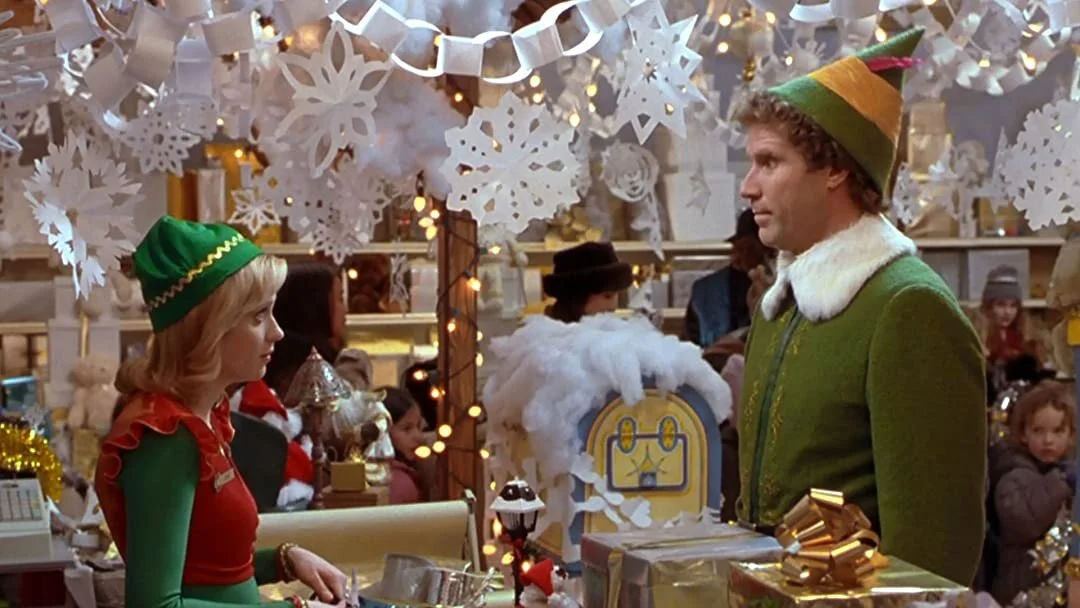Elf (dir. Jon Favreau, 2003) - Review
Download the Elf screenplay here for personal, private use.
Will Ferrell was ubiquitous in the top box officer-earners of the 2000s, with his 26 projects of the decade grossing over a billion dollars. 2003’s Elf accounted for $173,398,518 of that total.
Critic Colin Tait has suggested that “the key to Ferrell’s success is his genuinely likeable comic persona that relies on … excessively masculine and feminine traits. His humour seemingly derives from his inability to contain the excesses of either gender.” Perhaps this ability to appeal to the extreme, or indeed repressed traits of viewers of multiple ages and genders lies at the heart of the continued success of Elf, Ferrell’s biggest hit- currently in its second week at the top of the UK’s Official Film Chart.
After a beloved tenure on SNL, Ferrell picked up scene-stealing secondary roles such as villainous fashion designer Mugatu in Zoolander (2001), but made the transition to stardom via the risky tale of an adult man raised by elves running around New York in yellow tights. For all the project’s risks- Ferrell recalled thinking it could end his career- the film became a box office success, leading to a slew of other now-iconic naughties roles such as Anchorman (2004), Talladega Nights (2006), and Step Brothers (2008).
So what is it about Elf that inaugurated both Will Ferrell’s status as a benign, dorky titan of the ‘Frat Pack’, and the movie’s unexpected legacy as a cult holiday classic? Director Jon Favreau, who rewrote David Berenbaum’s original, darker, PG-13 rated script, remembered that “the key to a Christmas message is the message and the theme… on the one hand I wanted to get big laughs, but on the other hand I wanted to make a movie that had the potential to be a classic”. Elf delivered on both, due to the unique compatibility of Ferrell’s ‘genuinely likeable comic persona’ with a premise which asks viewers not so much to suspend disbelief as to gleefully cast it to the wayside. Ferrell’s authentic joy in his own ridiculousness resonates with the central ideology of the film strongly enough to carry viewers along the tide of several knowingly fantastical narratives- the White Christmas, the New York Adventure, the Fractured Family Reunion- in the conviction that a childlike, or Buddy-like, enthusiasm for such narratives can help make modern life a little more joyous.
Mary Steenburger, who plays Buddy’s stepmother, said of the former character that “he injects the magic back into everyone’s lives… he reminds you that we’re all capable of being magical and remembering what it is to be a child”. Steenburger’s words apply in a personal sense to Ferrell, who gained recognition for playing characters with no self awareness on SNL (More Cowbell, anyone?), and commented that he celebrated the same quality in Buddy, his first post-SNL starring role. Unlike many of his contemporary comedians- notably Jim Carrey and Owen Wilson- Ferrell maintains a markedly wholesome private life, with a 20-year marriage and a reputation for professionalism and pleasantry; despite his affinity for playing sleazebags and dullards, a Guardian interviewer summed it up with the observation that “in real life, he is more Buddy than Burgundy”. It is partly this added sense of authenticity which has secured Elf’s position in the holiday canon, particularly when the demographic who grew up on it are finding so many stars of their childhood screen fodder prone to ‘cancellation’.
Elf hasn’t aged badly either. Indeed, it probably chimes more than ever with millennials and Gen Z’s who can now relate all too strongly to its dismay about the ever-expanding grimness of corporate America, to which, the film implores, personal relationships and individual joy must not be sacrificed. Ferrell’s Buddy, raised by elves in Santa’s workshop, discovers at the age of 30 that he is adopted, and travels to New York to find his biological father. Unfortunately, his father Walter (James Caan, of The Godfather) is a heartless businessman on the ‘naughty list’, whose professional life is totally derailed by the childlike Buddy. Yet, as Santa says when explaining the situation: “Some people, they just lose sight of what's important in life. That doesn't mean they can't find their way again, huh?”
Buddy’s authentic ability to “find joy and interest in the smallest of things”, per Ferrell, proves capable of conquering the coldest of narratives. The stereotypically cynical, impersonal citadel of New York is most memorably undone by the famous scene in which Buddy bursts into a shop with ‘World’s Best Coffee’ on the window to congratulate their success; despite Santa’s warnings about eating gum off the streets and avoiding peep shows, early references to convince the audience of the joke, Buddy’s naturally trusting, innocent nature wins out anyway. The authenticity of his decision to simply throw caution and conformity to the wind, careless of the fear of failure or humiliation which characterises such ideas of New York and modern society, benefits immensely from guerrilla-style filming, with Ferrell in full elf costume interacting with unwitting members of the public on New York City streets. It’s not just Buddy’s success in New York and his biological family on the line here- as Ferrell recalled, it was his own film career.
Áine Kennedy is a London-based writer and manager of the ScriptUp blog.





